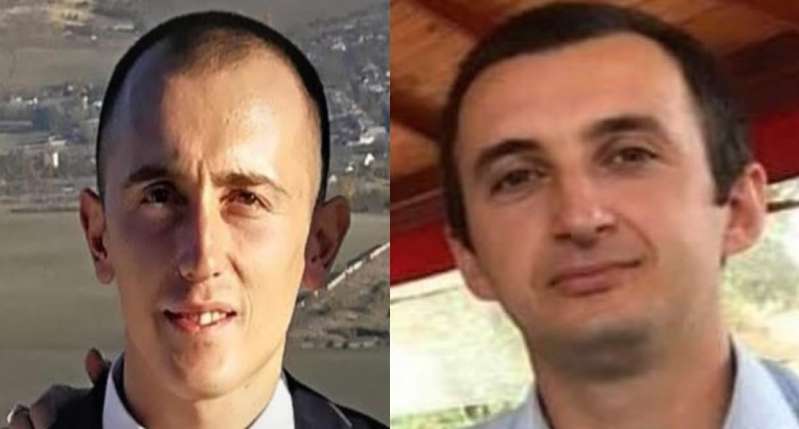• Topics / Human Rights Abuses in Russian-occupied Crimea
Crimean Tatar abducted after day of FSB searches in Russian-occupied Crimea

Two young men were subjected to searches in Russian-occupied Crimea on 16 March, with 26-year-old Dilyaver Ibraimov then effectively abducted and only released around 12 hours later. The enforcement bodies refused to tell lawyer Emil Kurbedinov where the young man was, thus depriving him of legal defence. On other occasions, men abducted in this manner have later reported being savagely tortured in order to get them to agree to collaborate with the FSB or sign ‘blank confessions’.
Crimean Solidarity reports that two searches were carried out on 16 March in the Dzhankoy region of Crimea, the second being in the home of another Crimean Tatar Osman Kurtaliyev. He is not living in Crimea, and it was his mother, Ediye Kurtaliyeva who was in the house during the search which last around two hours. The FSB, she says, are accusing her son of involvement in Noman Çelebicihan (or Asker) Battalion, which is legal in Ukraine.
In its many politically-motivated prosecutions of Crimean Tatars on similar charges, the Russian FSB claim that the Noman Çelebicihan Battalion is “an unlawful armed formation, acting on the territory of a foreign country for purposes which are against the interests of the Russian Federation”.
It is certainly true that the Noman Çelebicihan Battalion is opposed to Russia’s invasion and annexation of Crimea, which the current regime could consider “against its interests”. Wanting an end to Russia’s occupation of Crimea does not make the battalion illegal and the claim that it is an armed formation is simply false. The battalion was formed on 1 January 2016 from people who had taken part in the essentially peaceful civic blockade of Crimea from 20 September 2015. It remains a relatively small formation whose role at present is merely to back the Ukrainian border guards in areas near the administrative border with occupied Crimea. Islyamov has long indicated that this is a Crimean formation, not only Crimean Tatar. While they would be willing to serve in the Armed Forces in the area of conflict in Donbas, the steps needed to formalize such service have yet to be taken.
Osman Kurtaliyev is, fortunately, out of the FSB’s reach, unlike 55-year-old Nariman Nezhmudinov, who was seized by the FSB in early February 2020, with the arrest only reported on 17 February. Although Russian and Russian-controlled media claimed that “The FSB in Crimea have detained a Ukrainian national battalion fighter” and showed the FSB in full military gear bursting into Nezhmudinov’s home, the FSB’s own video recording gave the lie to the propaganda claims. The FSB can be seen pinning to the ground a person who is evidently older and unarmed. The man can later be seen signing documents at a table with several packages clearly containing his medication.
Despite the lack of any evidence of involvement in the Battalion and its entirely legal status in Ukraine, Russia has already sentenced at least three Crimean Tatars on these charges and has brought a number of similar charges against other Crimean Tatars in absentia.
On 28 August 2019, the Russian-controlled Kirov District Court sentenced 22-year-old Dilyaver Gafarov to 10 years in a maximum security prison on the same unproven charge of involvement in a legal formation. The de facto prosecutor claimed that Gafarov was part of a group of reconnaissance agents and that he was Islyamov’s personal guard. Gafarov denied any such involvement in the Battalion (details here).
On 25 January 2019, Fevzi Sahandzhy was sentenced to 10.5 years despite the young man’s allegations of torture and the same fatally flawed charges. On 14 May, a panel of ‘judges’, led by Oleg Lebed, from the Russian-controlled Crimean High Court confirmed the sentence, The Russian and Russian-controlled media reported Sahandzhy’s arrest (or at least the arrest of a 24-year-old Crimean Tatar) in March 2018. He asserts that he was seized by FSB officers in October 2017 and that they had forced him, under torture, to sign various documents. The flawed nature of this prosecution is made all the more disturbing by the fact that there are no photographs of Sahandzhy himself.
Then on 13 June 2019, the same Kirov District Court sentenced Edem Kadyrov to four years’ imprisonment and a further year of restricted liberty, also for supposed involvement in the Battalion. Virtually nothing is known about Kadyrov, except that he is 25 and that Russia claims that he too was Islyamov’s personal guard, which Islamov denies.
Although very little information is available, it does seem possible that the two searches carried out in the Dzhankoy region of young Crimean Tatars were in some way linked.
The ominous difference in Ibraimov’s case lay first in the fact that he was at home at 7 a.m. when the FSB turned up, and that he was there alone. There would have been no reason for the secrecy over the next 12 hours and refusal to tell Ibraimov’s lawyer Kurbedinov that the young man was at the FSB office in Simferopol had the young man not been subjected to torture or other illegal forms of pressure.





